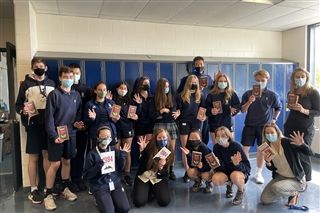1984 by George Orwell is considered by many to be classic literature. Published in 1949, it has long been discussed because of its political themes and ideas. Set in a futuristic and dystopian society, 1984 looks at totalitarianism, mass surveillance and oppressive ruling.
Analyzing 1984 is not a small undertaking, but some Grade 9 students have dedicated four hours to this cause. Started in early April, by enthusiastic Language and Literature teachers Ms. Jamie Elbert, Ms. Sarah Riddell and Ms. Sarah McKerlich, the 1984 Book Club has met to discuss Orwell’s masterpiece.
The Grade 9s have made significant progress, learning not only about Orwell’s main themes but also about Michel Foucault’s theories, surveillance culture and the importance of language.
In his apartment in London, Oceania (comprised of the modern day Americas, Australia, and a portion of Africa), Winston Smith, the main character, starts a secret and illegal diary where he records his thoughtcrime. This is a Newspeak term for thoughts that are unorthodox or against the beliefs of the Party, the ruling political party of Oceania and their leader, Big Brother. Hence the famous slogan “Big Brother is Watching You.” Eventually, Winston gets caught. Tortured both physically and mentally, Winston is persuaded and reformed to believe everything that the Party and Big Brother says is true.
The first meeting was on Thursday, April 8, and the discussion focussed on the basics of storytelling: the plot, conflict, characters and big themes. During the second meeting, readers started delving deeper into the thematic ideas of Orwell’s 1984.
By learning about Michel Foucault’s theories, the Panopticon, and surveillance culture, we began to understand more about Winston’s world. Foucalt’s theory of power was discussed most vehemently in Book Club. Foucalt believed that “power is everywhere and comes from everywhere” and lies not just with one person or group. As an example, Winston choose to believe that the proles, short for proletarian—working and poorer class of Oceania—have more power than Big Brother. “If there is hope, it lies in the proles” (pg. 72), as the proles make up a large portion of the population in Oceania so they had the power to revolt and overthrow the government.
In the third meeting, we discussed the use of language in the story, an important aspect that serves to bring 1984 to life. Orwell’s fictional language in the novel, Newspeak, highlights how language plays an important role in society and influences the mind. By restricting the vocabulary and simplifying grammar to only a few words, thought is restricted, thereby allowing Big Brother to control the people.
There is still so much to 1984, and even with just four hours of discussion, readers left with new views and an understanding of politics and the importance of language. Most importantly, we learned that what makes 1984 a classic is how its theories are still relevant today.





